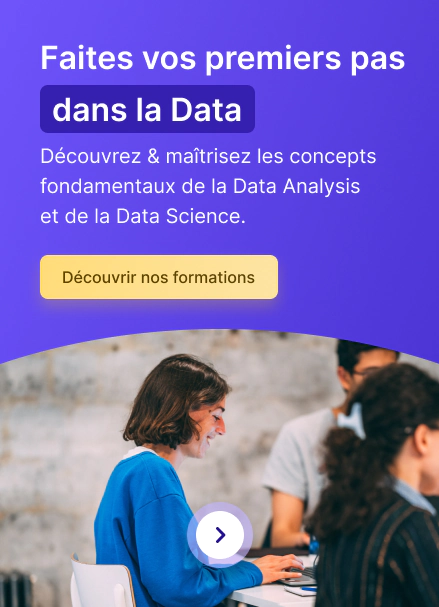Les méthodes et technologies d'analyse de données

Sélectionnez un chapitre
Dans un environnement où les technologies du numérique ont redéfini profondément les modes de consommation et de production, la Data Analysis est une arme redoutable pour dynamiser l'activité professionnelle. Les entreprises, peu importe le secteur d'activité, accèdent aujourd'hui à une quantité énorme de données qu'il faut interroger de la manière adéquate pour optimiser la prise de décision. L'analyse de données ou Data Analysis est ce processus, désormais fortement informatisé, qui favorise la transformation et la modélisation des données pour offrir une meilleure compréhension de ces dernières. Leader français dans la formation en analyse Data, Jedha dévoile ici les méthodes et technologies d'analyse de données.
Qu'est-ce qu'une méthode d'analyse de données ?
En Data Analysis, une méthode d'analyse est un processus statistique, informatique ou dérivé de l'IA qui permet d'extraire le maximum d'informations exploitables d'un groupe de données à disposition. En nettoyant, transformant et modélisant les données, la méthode d'analyse cherche à établir des liens statistiques significatifs entre ceux-ci et de construire un véritable Data Pipeline. Le but est la description des principales informations statistiques véhiculées par les variables en présence pour faciliter certaines tâches. Une analyse réussie des variables concernées peut en effet être très utile pour réaliser une étude de marché, un projet de développement d'un nouveau produit ou encore un profilage des clients.
Le choix adéquat de la méthode d'analyse prend en compte la qualité des données et les résultats espérés pour la Data Analysis. Aujourd'hui, les méthodes d'analyse des variables statistiques à partir d'un échantillon de données sont nombreuses. Elles s'adaptent à toutes les configurations pour les applications du Big Data. Jedha apporte les meilleures offres de formation en Data Analysis afin de vous donner une excellente maitrise des méthodes et technologies d'analyse de données.
AWS RDS
Parmi les outils professionnels largement répandus pour l'analyse des données, AWS RDS occupe une très bonne place. Basée sur le cloud Amazon, AWS RDS favorise le déploiement sur site grâce aux moteurs tels qu'Oracle, PostgreSQL, MariaDB, My SQL et SQL Server. Le Data Analyst peut l'utiliser pour la configuration, l'exploitation et la mise à l'échelle des bases de données infonuagiques. Il offre une vue statistique exhaustive, mais synthétisée sur les performances des bases de données.
Grâce notamment à Performance Insights, l'analyse et la visualisation des charges de travail au niveau SQL sont automatisées. Toutes les métriques nécessaires à la surveillance sont accessibles facilement sous forme de tableaux. Cela évite l'étude de graphiques statistiques complexes pour les variables de performances. En indiquant la nature et l'importance des problèmes de performances des bases de données liés au SQL, AWS RDS facilite le développement informatique, la migration des bases de données d'activité et le test d'applications.

L'analyse en composantes principales (ACP)
L'analyse en composantes principales fait partie des méthodes phares de la statistique multivariée. Elle aide à synthétiser et à extraire au mieux l'information en réduisant le nombre de variables. En identifiant les directions d'inertie maximale pour chaque variable et en expliquant la variance des données associées, l'ACP offre la possibilité de transformer des variables liées entre elles d'un point de vue statistique.
On obtient alors de nouvelles variables non corrélées qui rendent mieux compte du phénomène à étudier. Cela facilite les méthodes de modélisation en statistique telles que l'analyse discriminante, la régression linéaire, la régression logistique… Les applications statistiques de l'ACP sont multiples. Elles peuvent être utilisées pour la visualisation des observations dans un espace à deux ou trois dimensions, l'étude de la structure d'un ensemble de variables ou encore l'identification des groupes homogènes d'observations.
Data Mining
Il s'agit de s'appuyer sur des méthodes statistiques, l'intelligence artificielle ou encore l'informatique pour tirer un maximum d'informations à partir des modèles construits grâce à de grandes quantités de données. Il s'agit de la composante principale du Big Data. Un projet de Data Mining est principalement élaboré en fonction des résultats fixés pour l'analyse de chaque variable. Pour une modélisation efficace, on pourra alors choisir des techniques statistiques descriptives (analyse des correspondances multiples, analyse en composantes principales, analyse en composantes indépendantes). On pourra aussi opter pour des méthodes prédictives (les arbres de décision, les réseaux bayésiens, modèle additif généralisé, la méthode des k plus proches voisins).
Le projet d'analyse de données peut s'intéresser à :
- l'analyse de séquence : recherche de patterns traduisant la causalité entre deux évènements non simultanés,
- l'analyse des patterns : traduit une liaison non causale entre des variables,
- le clustering : identifie de nouveaux schémas ou groupes de fait inconnus sans recourir des structures déjà connues,
- la classification : concerne la généralisation des structures d'exploration connues à la découverte de nouvelles données,
- la prédiction : permet d'évaluer de manière statistique, les possibilités futures grâce aux patterns de données continues.
Pour l'optimisation des sites web, le marketing ou encore la détection de fraudes, les résultats issus d'un projet de Data Mining sont très utiles. Jedha propose une formation en analyse des données, notamment en Data Mining à l'endroit de tous les profils d'étudiants.
Data Exploration
Faisant partie des outils d'analytique visuelle, la Data Exploration est la première phase de l'analyse des données. Il s'agit d'explorer un vaste ensemble de données en identifiant ses points d'intérêt et ses caractéristiques principales (taille, typologie, nature, possibilités de transformation…) pour optimiser le traitement analytique ultérieur. Toutes ces informations statistiques sont résumées de manière simple et claire sous forme de diagrammes, tableaux de bord ou graphiques.
En dégageant les tendances, les corrélations, les explications de variance pour chaque variable, il est plus facile pour le Data Analyst de réduire un ensemble de données massif tout en le rendant plus qualitatif. La Data Exploration est une méthode primordiale pour réaliser tout projet de Data Mining. L'exploration des données est le plus souvent réalisée avec les langages Python et R.
Exploratory Data Analysis
Cette variante de l'exploration initiale des données se concentre sur les principales caractéristiques qu'elle essaie d'étudier et de résumer. Elle facilite l'identification des modèles au sein des données. Elle aide à tester des hypothèses sur le Dataset et à identifier les erreurs évidentes ou les évènements anormaux en rapport avec votre étude. Cette analyse permet d'examiner la validité de certains résultats préalablement obtenus sur certaines variables.
On arrive aussi à mieux comprendre les variables et les relations qu'elles entretiennent ensemble. Cela offre la possibilité de choisir les meilleures techniques statistiques pour le traitement des données afin d'obtenir les résultats dont on a besoin. Sous Python ou R, il est possible d'utiliser l'analyse exploratoire univariée ou multivariée (graphique ou non graphique) pour mieux interroger les données.
L'utilisateur a ainsi accès à plusieurs outils comme des statistiques isolées, des tableaux croisés, des histogrammes, des diagrammes à surface, des nuages de point, des cartes de densité. Les techniques statistiques associées à l'Exploratory Data Analysis sont entre autres le regroupement en k-moyennes, la régression linéaire, la réduction de la dimensionnalité des variables, les visualisations (univariées, bivariées ou multivariées).

Amazon Redshift
Il s'agit d'une technologie destinée à la gestion des charges de travail analytiques sur l'ensemble de données à grande échelle. Amazon Redshift est un Data Warehouse en ligne qui permet aux utilisateurs d'analyser des données à partir de leurs outils d'informatique décisionnelle. Pour l'analyse du Big Data, l'architecture basée sur le stockage des données en colonnes et le traitement massif parallèle des données de Redshift offre les meilleures possibilités. Que les données soient structurées ou pas, les requêtes SQL lancées grâce à cet outil s'exécutent très rapidement.
Redshift s'adapte aux besoins de la Data Analysis en offrant une automatisation exhaustive des tâches de gestion de bases de données relationnelles. Il s'agit entre autres de la classification de données, la génération de statistiques principales, l'intégration de données. Amazon Redshift est assurément un des outils d'analyse de données en ligne que tout spécialiste de la Data doit maitriser pour améliorer son travail.
La formation en analyse de données par Jedha
Jedha propose une formation de type bootcamp à toutes personnes désireuses de maitriser les méthodes et technologies d'analyse de données les plus performantes. Grâce à l'accompagnement d'enseignants hautement qualifiés et expérimentés, chaque étudiant découvre à son rythme toutes les problématiques liées à l'analyse de données. Les modules de formation pour devenir un Data Analyst confirmé sont :
- SQL & Cloud computing,
- Data visualisation,
- Machine Learning,
- A/B Testing & Web Analytics,
- Statistiques & Python.
Au terme de la formation en analyse des données, Jedha peut également vous accompagner lors de votre insertion professionnelle.
Pour les applications du Big Data, les méthodes, outils et technologies d'analyse des données sont nombreux. Tout dépend des ensembles de données en présence et des objectifs poursuivis par votre analyse. En tant qu'organisme de formation reconnu par l'État, Jedha réalise une formation de grande qualité pour aider à devenir un maitre dans le domaine du Data Analysis.
Articles recommandés
Analyse de donnees
Analyse de données - Présentation et Formation | Jedha
Jedha vous fait découvrir l'analyse de données à travers l'apprentissage des mécanismes de collecte, stockage, analyse et visualisation.
Analyse de donnees
Qu'est-ce que le Data Mining ? | Jedha
Le Data Mining est le processus d'exploration de données réalisé à partir d'algorithmes, découvrez son utilité et les différentes méthodes d'exploration.
Analyse de donnees
Qu'est-ce que l'Exploratory Data Analysis (EDA) | Jedha
L'Exploratory Data Analysis ? Une révolution Big Data dans tout les secteurs d'entreprises ! Explorons ensemble les outils et technologies utilisés pour l'analyse des données, le fonctionnement de l'Exploratory Data Analysis et l'importance capital du Big Data pour les entreprise.




